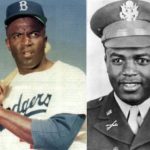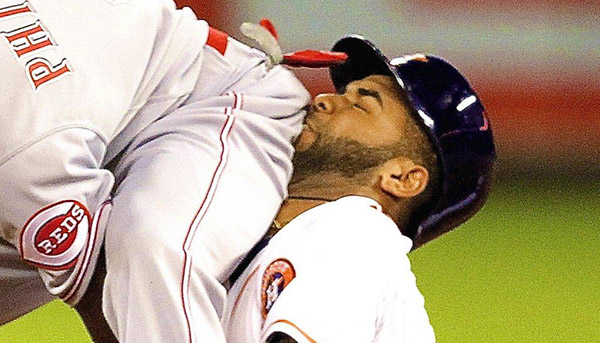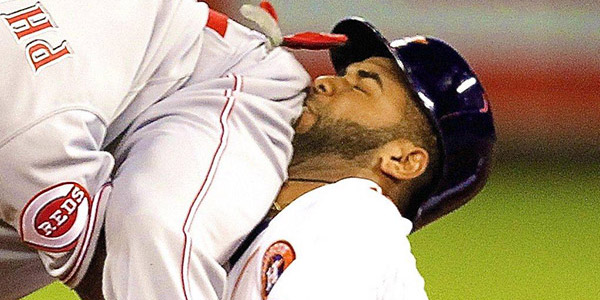Houston Astros Are the Next Sports Dynasty
 As the New England Patriots dynasty nears its end, American sports fans must look for a new one. With today’s rapid changes in technology and availability of insightful data, the 2017 World Series champion Houston Astros seem to be the likely suitor.
As the New England Patriots dynasty nears its end, American sports fans must look for a new one. With today’s rapid changes in technology and availability of insightful data, the 2017 World Series champion Houston Astros seem to be the likely suitor.
This season the team won 103 games in defense of its title. However, they had the misfortune of matching up against a Boston Red Sox team with 108 wins and the Astros also had injuries to a few key players. That’s just baseball. A few plays different here or there was all the difference between advancing or going home. But, that doesn’t take away from the foundation that has been built in Houston.
Their system, as we’ve discovered can be nefarious at times, but also ingenious. As their opponents continue to evolve, so does their system. All the ways the Red Sox beat the Astros in the ALCS will be identified, analyzed, and counteracted by the Houston front office so that it never happens again.
For an organization to become a dynasty, there are three key factors that need to be set in place—the right personnel, an adaptive system and drive.
The Astros’ front office has one simple daily goal: Deliver better information to managers, players and coaches so they can make better decisions. In the past, people reviewed analytics based on past performance. The Astros have created an agile system based on cognitive psychology and sabermetrics that can almost predict the future. It’s not just about home runs, on-base percentage and strikeouts. It’s about asking the right questions:
How likely is this pitcher going to get hurt rather than another pitcher based on our biomechanics algorithm?
Does this hitter’s swing mechanics project more power in the future?
Why does this scout consistently overvalue movement on young pitching prospects?
By asking these questions, you can discover that a bad scout can actually provide value, as long as he is consistently bad. The Astros developed a predictive analytical system based on performance data, human behavior, scouting, and biomechanics. However, the reason they’ll become the next sports dynasty isn’t because of how great their system is, and it’s really good. It’s the people behind the system making the right adjustments. Think of the Astros as an iOS update on your iPhone, but instead of every few months, it updates every day based on your current preferences and predictive future activity. It’s a system that consistently gets better in real time. But like every great dynasty, it starts at the top.
 Jeff Luhnow, President of Baseball Operations and General Manager
Jeff Luhnow, President of Baseball Operations and General Manager
Luhnow grew up in Mexico City, but attended an American school, where he became fluent in Spanish. He got into fantasy baseball while studying engineering at the University of Pennsylvania, and he had a knack for picking MLB players in the minor leagues who were on their way up. He won or came in second every year in his fantasy leagues.
After his time at Penn, he worked as an engineer for three years, then he got his MBA from Northwestern University. He was a management consultant for five years and, during that time, became friends with a guy who married a girl whose dad was the owner of the St. Louis Cardinals, Bill DeWitt Jr. Shortly after, Luhnow went out to Los Angeles to run two start-up technology companies. One in the dot com space (Petstore.com) and one in the apparel space (Archetype Solutions). At Archetype solutions, customers were allowed to design clothing fitted to them, based on their personal measurements of their bodies. It was here that Luhnow noticed something interesting. One of the company’s biggest problems was that the measurements were often wrong because they were reported too small. People thought they were skinnier than they actually were (guilty!). To fix this, Luhnow created an algorithm that counteracted the cognitive bias customers had about their own body size.
In the summer of 2003, the best-selling book Moneyball came out, chronicling the 2002 Oakland A’s front office and how they assembled a team of undervalued players by using sabermetrics, despite a small budget. Every good baseball executive in the business had read the book, including Bill DeWitt Jr. While doing fundraising for his start-up, Luhnow ran into his old consulting friend. He told Luhnow that DeWitt was looking to bring someone in who had a business and analytic background to help him “sort all of this sabermetric stuff out.”
 Sig Mejdal, Special Assistant to the General Manager, Process Improvement
Sig Mejdal, Special Assistant to the General Manager, Process Improvement
Mejdal grew up in California as an avid baseball fan playing All-Star Baseball, which is an old board game that allowed you to manage players while simulating major league games. In the sixth grade, he began subscribing to newsletters from SABR (Society for American Baseball Research) and most likely, never attended a middle school dance.
Later on, while working as a blackjack dealer at local Lake Tahoe casino, Mejdal began noticing unusual behavior from the card players. He concluded that people don’t always make decisions that serve their long-term interests. For example, players would often not hit on a 16 against a dealer’s 7. Blackjack is a probabilistic game. Analytically, standing would give the player a 74% loss rate vs. hitting, which would provide a 67.5% loss rate. However, the fear of busting was just too much for the players to handle, so they’d often stand.
It’s the same reason why more NFL coaches should go for it on fourth down. It’s why NBA front offices have implored their high-percentage shooters to shoot more three-pointers vs. mid-range jump shots. There’s obviously more risk involved, but in the long term, there’s even more reward.
Mejdal would go on to double-major in mechanical and aeronautical engineering at the University of California, Davis. He would eventually obtain two masters degrees, one in operations research and the other in cognitive psychology. He eventually became a researcher for NASA’s Fatigue Countermeasures Group.
Again, when Moneyball came out in 2003, it opened the door for someone with Mejdal’s background to potentially work in Major League Baseball. He jumped at the chance by sending out proposals to all MLB teams. None of the clubs ever got back to him, except for one guy who was just hired as the St. Louis Cardinals Vice President of Baseball Development, Jeff Luhnow.
The Astros’ system does not rely solely on analytics, despite what people think. They synthesize human observation into their probabilistic analytical models. When Luhnow came to St. Louis, he changed how they conducted their drafts. The idea was to combine all the scouting information and performance data down to one number. Mejdal created an integrated system called STOUT, which is half stats and half scouts. Draft sessions can sometimes last up to 13 hours straight, so it was common to not invite the area scouts into the draft room because of the loud arguing over which players should or should not be selected. However, to keep to true to his vision of combining qualitative scouting reports and quantitative performance data, Luhnow invited them in. There were some stipulations because just as the club wanted peak performance from its players, it wanted the same from their front office. There was no food or phone calls allowed during each session. People were more likely to become less of an advocate of their picks and more of a “yes man” after a belly full of food.
“Human nature is to tell us what you think we want to hear, and that’s not what we’re looking for.”
—Jeff Luhnow, Astroball
The Cardinals 2009 draft class, which is considered one of the best in recent history, ultimately yielded players such as Matt Carpenter, Matt Adams, Shelby Miller, Joe Kelly and Trevor Rosenthal, who were all on the Cardinals’ 2013 World Series roster. During the 2011 Winter Meetings, Luhnow was hired by Houston. His first hire was of course, Sig Mejdal.
In 2006, a system called PITCHf/x was introduced by MLB. It’s a system that uses several angled cameras to calculate pitch velocity, release point location, and horizontal and vertical break. This data was available to everyone. The brilliance of the Astros is how they used it. Mike Fast was a part of Mejdal’s analytics team. He was also a former semiconductor engineer and a quick adopter of PITCHf/x. In 2013, the Astros claimed a pitcher named Collin McHugh off waivers, which is a nice way of saying no team wanted him. The reason they claimed him was because of something that Mike Fast discovered. McHugh didn’t have great skills, but what he did have was a curveball that revolved more than 2,000 times per minute. During his PITCHf/x analysis of McHugh, Fast concluded that his curveball spin rate was one of the best in MLB. Armed with this knowledge, the front office told McHugh to start throwing his curveball a lot more. So he did. In 2015, McHugh finished second in the American League with 19 wins.
Along with analytics, the Astros also apply human behavior to their decision making. They figured out how to calculate some of the human element by scouting their own scouts. They created a numeric behavioral metric that calculates scouting information, including personality, health, family history, shape of swing and pitching mechanics. This included all of the reports their own scouts had submitted, which ranged all the way back to 1997. Then they ran a regression analysis on all the scouting data to determine which assessments had real value and which were because of cognitive bias.
For any dynasty, longevity and success are imperative. Why will the Astros continue to win in the future? Why work so hard for so long? Why continue to labor over minute details when your team has already won a championship?
The simple answer? Drive. When Luhnow was hired by the Cardinals, several people from their front office wouldn’t even talk to him. They called him “Harry Potter” behind his back. The Astros organization consists of a group of people who feel overlooked and have something to prove. It’s no different than Tom Brady being a sixth-round draft pick and becoming arguably the greatest NFL quarterback of all-time.
Luhnow and Mejdal look for players who are like themselves: outsiders looking in. They want players who are unsatisfied with their situation and intellectually curious about improving. They refer to it as a “growth mindset.” Perhaps that’s why they choose players like 5’-5’’ Jose Altuve, who at his first tryout with the Astros was told to go home because he was too small. Altuve came back the next day, talked his way onto the field, and he’s never left. That persistence is what makes a dynasty.

























